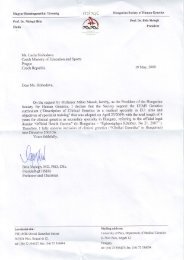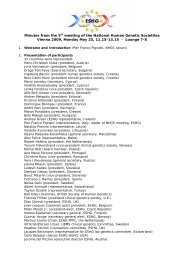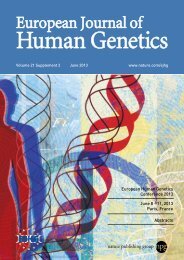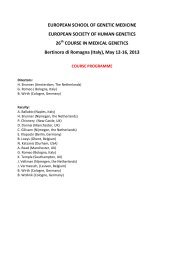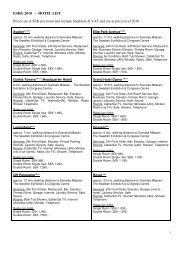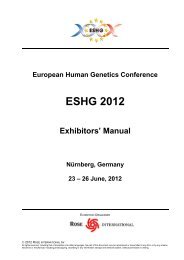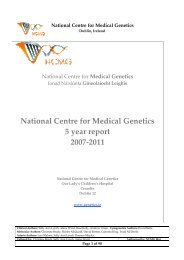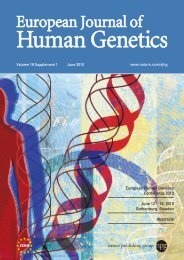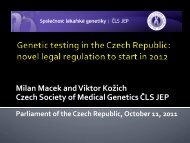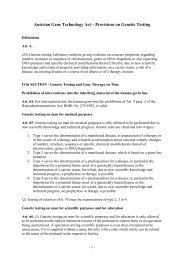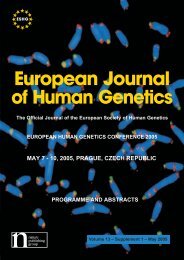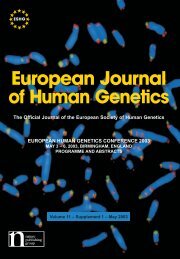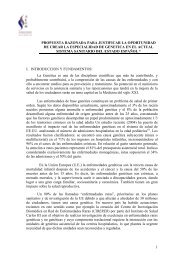2008 Barcelona - European Society of Human Genetics
2008 Barcelona - European Society of Human Genetics
2008 Barcelona - European Society of Human Genetics
You also want an ePaper? Increase the reach of your titles
YUMPU automatically turns print PDFs into web optimized ePapers that Google loves.
EMPAG Posters<br />
with resultant specialist care for the families .<br />
An audit <strong>of</strong> conditions referred to GHSV, uptake by families, role <strong>of</strong><br />
genetic counsellor at coronial and clinical service and outcomes over<br />
a 2 year period is discussed and presented as a model for future and<br />
extended collaboration between forensic and clinical medical genetics<br />
unit .<br />
EP05. Access to genetic services<br />
(challenges in Europe)<br />
EP05.1<br />
Why don’t Deaf People come for Genetic counselling?<br />
A. Middleton1 , S. Emery2 , G. Turner2 , A. Clarke1 , S. Sarangi3 ;<br />
1Institute <strong>of</strong> Medical <strong>Genetics</strong>, School <strong>of</strong> Medicine, Cardiff University, Cardiff,<br />
United Kingdom, 2Department <strong>of</strong> Languages & Intercultural Studies, School <strong>of</strong><br />
Management & Languages, Heriot-Watt University, Edinburgh, United Kingdom,<br />
3Health Communication Research Centre, School <strong>of</strong> English, Communication<br />
and Philosophy, Cardiff University, Cardiff, United Kingdom.<br />
Despite genetic deafness being one <strong>of</strong> the most common genetic conditions,<br />
deaf adults very rarely access genetic counselling, neither to<br />
discuss deafness nor other conditions that may be running through<br />
their family, e .g . cancer . Each genetics centre in the UK will have several<br />
thousand deaf sign language users within their catchment area;<br />
however, referrals are likely to be received for less than 5 deaf adults<br />
per year . There may be many complex reasons behind this - e .g . lack<br />
<strong>of</strong> information, assumptions about inheritance, mistaken beliefs <strong>of</strong> a<br />
link between present-day genetics services and eugenic practices <strong>of</strong><br />
the past or fears about being told not to have children . This project<br />
aims to gather the views <strong>of</strong> various different groups <strong>of</strong> people with<br />
deafness, looking specifically at the above issues. 30 interviews have<br />
been conducted in sign language and qualitative analysis performed .<br />
Video clips <strong>of</strong> deaf people signing their views about genetics will be<br />
shared as well as results from a large (n = 1000) quantitative study<br />
gathering attitudes. The research findings <strong>of</strong>fer suggestions as to why<br />
currently genetics services are very rarely used by deaf patients in the<br />
UK . Once more is understood about this then steps can be taken to<br />
address access issues .<br />
EP05.2<br />
Genetic Led multidisciplinary clinics As communities <strong>of</strong><br />
Practice<br />
S. A. Watts;<br />
Guy’s Hospital, London, United Kingdom.<br />
Care for patients and their families with genetic disease has become<br />
increasingly complex in recent years due to a rapid rise in scientific<br />
knowledge, expanding technological innovation and demand for services,<br />
resulting in a need for multidisciplinary working . Although such<br />
working is well documented in general healthcare there is sparse literature<br />
within the specialty <strong>of</strong> clinical genetics . The results <strong>of</strong> an ethnographic<br />
study, which sought to examine the way in which patient<br />
care was organised and delivered in three multidisciplinary clinics<br />
in a Regional Genetic Centre in the UK, will be presented . Different<br />
models <strong>of</strong> healthcare were identified. However, data analysis using<br />
the theoretical framework <strong>of</strong> Communities <strong>of</strong> Practice (Wenger 1998),<br />
a theory <strong>of</strong> social learning and participation, suggests that functioning<br />
<strong>of</strong> the clinics is more closely related to the way in which clinicians<br />
establish a specific pattern <strong>of</strong> working together. The principal factor<br />
that contributes to the success <strong>of</strong> the clinics is that <strong>of</strong> coherence . The<br />
Genetic Counsellors play a crucial role to this coherence by acting<br />
as maintainers <strong>of</strong> the clinic . The results <strong>of</strong> this study contribute to our<br />
understanding <strong>of</strong> multidisciplinary working within clinical genetics and<br />
are important for the future planning and implementation <strong>of</strong> healthcare<br />
for patients with genetic disease .<br />
EP05.3<br />
<strong>European</strong> Network <strong>of</strong> Genetic Nurses and counsellors<br />
C. Patch1 , H. Skirton2 ;<br />
1 2 Guys and St Thomas’ NHS Foundation Trust, London, United Kingdom, University<br />
<strong>of</strong> Plymouth, Taunton, United Kingdom.<br />
While there are a growing number <strong>of</strong> non-medical genetic practitioners<br />
in clinical practice in Europe, there is no <strong>European</strong>-wide organisation<br />
dedicated to the needs <strong>of</strong> those pr<strong>of</strong>essionals . In an environment<br />
where the numbers <strong>of</strong> genetic tests are growing, the need to educate<br />
and develop non-medical practitioners who are competent in genetics<br />
is essential . Importantly, nurses and counsellors may also be working<br />
in situations with few colleagues, where peer support is hard to<br />
access . To address these needs, late in 2007, with the support <strong>of</strong> the<br />
ESHG, a new <strong>European</strong> Network <strong>of</strong> Genetic Nurses and Counsellors<br />
was initiated .<br />
An invitation to join the network was sent to EuroGentest and ESHG<br />
members, requesting that they pass it on to any genetic nurses or<br />
counsellors known to them in their countries. Language is a difficulty<br />
and colleagues from several countries have <strong>of</strong>fered to translate the information<br />
for colleagues who do not speak English . It is clear from the<br />
responses that pr<strong>of</strong>essionals in many countries are trying to develop<br />
this new pr<strong>of</strong>ession and are keen to use the network for support during<br />
this important period .<br />
A questionnaire has been sent to establish the aims and focus <strong>of</strong> this<br />
network and the findings will be presented at an initial meeting <strong>of</strong> the<br />
network at the EMPAG/ESHG conference in <strong>Barcelona</strong><br />
As <strong>of</strong> February <strong>2008</strong>, the network has 72 registered members from<br />
Netherlands, France, Spain, Portugal, Denmark, Sweden, Finland, Italy,<br />
Croatia, Bulgaria, UK, Czech Republic, Greece, Belgium, Cyprus,<br />
Ireland, Turkey, Israel, Switzerland, Poland and Iceland .<br />
EP05.4<br />
the value <strong>of</strong> personal interaction: can a family history<br />
questionnaire replace a face-to-face family history gathering<br />
appointment with the genetic counsellor for parents <strong>of</strong> children<br />
with an undiagnosed genetic syndrome?<br />
B. J. Dell 1 , G. Westwood 2 , C. Phelps 3 ;<br />
1 School <strong>of</strong> Medicine, Cardiff, United Kingdom, 2 Wessex Clinical <strong>Genetics</strong> Service,<br />
Southampton, United Kingdom, 3 Institute <strong>of</strong> Medical <strong>Genetics</strong>, Cardiff,<br />
United Kingdom.<br />
Evidence suggests that parents <strong>of</strong>ten feel unprepared for their contact<br />
with Genetic Services (Skirton, 2006) . Whilst family history questionnaires<br />
(FHQ) are increasingly used to gather data prior to attending a<br />
genetics clinic, such questionnaires have been found to raise anxiety<br />
(Phelps et al, 2006) and can act as a barrier to accessing services<br />
(Geer et al, 2001) . This pilot study explored the impact <strong>of</strong> completing a<br />
specially developed FHQ upon subsequent perceptions <strong>of</strong> providing a<br />
family history face-to-face .<br />
Seven parents completed the FHQ and an evaluation questionnaire .<br />
Results revealed that whilst the completion <strong>of</strong> the FHQ did not have<br />
any overall negative impact, it did have the potential to raise distress<br />
when asking for sensitive details such as miscarriages .<br />
Four parents also completed telephone interviews to explore their perceptions<br />
<strong>of</strong> the FHQ and their appointment with the Genetic Counsellor<br />
. Thematic analysis revealed that parents encountered obstacles to<br />
the completion <strong>of</strong> the FHQ and that they appreciated their personal<br />
interaction with the Genetic Counsellor, which provided an opportunity<br />
for them to gain reassurance, to ask questions about the referral process<br />
and to clarify the relevance <strong>of</strong> the family history details .<br />
The combination <strong>of</strong> both the FHQ and the Genetic Counsellor clinic<br />
was the preferred option, permitting the parents to be better prepared<br />
to utilise their contact with the genetic services .<br />
EP06. Lay beliefs and public understanding<br />
<strong>of</strong> genetics<br />
EP06.1<br />
Using ethnography to optimise clinical practice in cancer<br />
genetics services<br />
M. T. Saleh 1,2 , B. Meiser 2 , K. Tucker 3 , J. Kirk 4 , M. Eisenbruch 5 , K. Barlow-Stewart<br />
1 ;<br />
1 Centre for <strong>Genetics</strong> Education, St Leonards, NSW, Australia, 2 The University<br />
<strong>of</strong> NSW, Sydney, Australia, 3 Hereditary Cancer Clinic, Prince <strong>of</strong> Wales Hospital,<br />
Sydney, Australia, 4 Familial Cancer Service, Westmead Hospital, Sydney, Australia,<br />
5 Monash University, Melbourne, VIC, Australia.<br />
This project explores, using ethnography, the cultural beliefs about<br />
inherited susceptibility to cancer amongst the Arabic-Australian Community<br />
.



